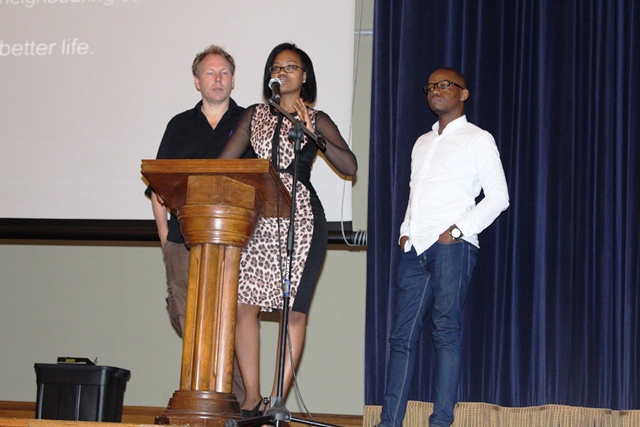With xenophobia sparking massive outrage after recently rearing its ugly head in South Africa, the Journalism Programme at DUT screened The Burning Man, a story depicting the life of Mozambique’s Ernesto Alfabeto Nhamuve who was set on fire by an angry mob in 2008.
The screening was held at the University’s Arthur Smith Hall, City Campus, on Wednesday, 29 April 2015. The documentary highlighted the brutal murder of Nhamuave, 35, who was murdered at the height of xenophobic violence in South Africa during Many 2008. Nhamuve became known as the “burning man” after horrifying photographs of his murder were splashed across newspapers around the world after being captured by photojournalists; becoming a symbol of xenophobic violence in South Africa.
The documentary tells the tragic story of the simple builder who lived with his brother-in-law; Francisco, in the Ramaphosa settlement, a slum east of Johannesburg, where they were renting a shack. The story also shows the aftermath of Nhamuve’s family had to deal with the tragedy in their village of Vuca near Homoine in Southern Mozambique.
According to Professor Anthony Collins from the University’s Journalism Programme, the documentary avoids the sensationalising of the well-known images and instead provides a sensitive exploration of Nhamuve himself.
Prof Collins’ work focuses on crime and violence. He is involved with community-work dealing with issues ranging from gender-based violence to xenophobia.
The screening was followed by a brief discussion on the recent xenophobic attacks as well as why it is important that xenophobia is understood and for the country to come to grips with.
One of the attendees, BTech Journalism student Thandi Jumo, said the documentary was thought-provoking and highlighted the devastating effects of xenophobia not only on the community, but on the families that are left behind. “Ernesto’s story really needs to be told,” she urged.
Hlengiwe Zondo, a businesswoman and graduate in Economics and Supply Chain Management, said it was imperative for South Africans to understand the xenophobic violence and its underlying issues. “For a long time as a society and as a government, we have been passive about it (xenophobic violence). We must have conversation as communities about this. It’s important that we individually understand our contributions and the role we play. Young people need to be involved and play a part in being active against any form of hate violence. So, if you see a family speaking about hateful crimes, reject it,” she said.
Ndumiso Ngidi, Student Development Practitioner in the Student Governance and Development Department at DUT, said some South Africans did not recognise foreigners a human. Ngidi’s interests and research are on gender-based violence, HIV prevention, youth in the townships and human rights.
Both Ngidi and Zondo are members of the Global Shapers Community, Durban Hub.
“We seem to, and I’m including myself, to have found a scapegoat in minorities. What I think is needed is to educate our young minds on various issues of poverty and xenophobia. We need to start going into communities and educating people in a way that enables them to speak up and voice their grievances or aggressions, enough to the extent that we try and find workable solutions. For me, that’s the only possible way,” said Ngidi.
Prof Collins cautioned that hate crimes not only group people together but escalate. “…and once you start talking a certain way about groups of people, you end up giving permission to people to be violent,” he said. Prof Collins also spoke about the role of the media in the mayhem, saying it (the media) has a responsibility to help South Africans understand the society they live in, develop empathy for one another and develop ways of supporting each other. “We need to have ongoing discussions around this issue of xenophobia and have discussions on what needs to be fixed in our society and really address these problems,” he said.
– Waheeda Peters
Pictured: DUT’s Prof Anthony Collins, Hlengiwe Zondo and Ndumiso Ngidi at the screening of the documentary: The Burning Man which depicts the life of Mozambique’s Ernesto Alfabeto Nhamuve who was set on fire by an angry mob during the height of xenophobic violence in South Africa in 2008.


